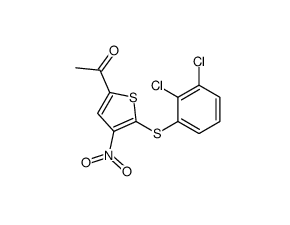
P005091
CAS No. 882257-11-6
P005091( P005091 | P-005091 | P 005091 | P 5091 )
Catalog No. M19224 CAS No. 882257-11-6
P005091 is a selective and potent inhibitor of ubiquitin-specific protease 7 (USP7) with EC50 of 4.2 μM.
Purity : >98% (HPLC)
 COA
COA
 Datasheet
Datasheet
 HNMR
HNMR
 HPLC
HPLC
 MSDS
MSDS
 Handing Instructions
Handing Instructions
| Size | Price / USD | Stock | Quantity |
| 2MG | 35 | In Stock |


|
| 5MG | 57 | In Stock |


|
| 10MG | 73 | In Stock |


|
| 25MG | 142 | In Stock |


|
| 50MG | 243 | In Stock |


|
| 100MG | 389 | In Stock |


|
| 200MG | Get Quote | In Stock |


|
| 500MG | Get Quote | In Stock |


|
| 1G | Get Quote | In Stock |


|
Biological Information
-
Product NameP005091
-
NoteResearch use only, not for human use.
-
Brief DescriptionP005091 is a selective and potent inhibitor of ubiquitin-specific protease 7 (USP7) with EC50 of 4.2 μM.
-
DescriptionP005091 is a potent and selective inhibitor of ubiquitin-specific protease (USP) 7 (IC50 = 4.2 μ M). P005091 induces elevated p53 and apoptosis in cancer cell lines and displays antiangiogenic activity in vivo . The deubiquitylating enzyme USP7 (HAUSP) sits at a critical node regulating the activities of numerous proteins broadly characterized as tumor suppressors, DNA repair proteins, immune responders, viral proteins, and epigenetic modulators. Aberrant USP7 activity may promote oncogenesis and viral disease making it a compelling target for therapeutic intervention.(In Vitro):P005091 is a trisubstituted thiophene with dichlorophenylthio, nitro, and acetyl substituents mediating anti-USP7 activity. P005091 exhibits potent, specific, and selective deubiquitylating activity against USP7. In contrast, P005091 does not inhibit other DUBs or other families of cysteine proteases tested (EC50 > 100 mM). P005091 inhibits the labeling of USP7 with HA-UbVME in a concentration-dependent manner. USP7-mediated cleavage of high molecular weight polyubiquitin chains is inhibited in a dose-dependent manner by P005091. Moreover, P005091 inhibits USP7- but not USP2- or USP8-mediated cleavage of poly K48-linked ubiquitin chains. USP7 inhibition by P005091 induces HDM2 polyubiquitylation and accelerates degradation of HDM2. P005091 inhibits USP7 deubiquitylating activity, without blocking proteasome activity in MM Cells. P005091 inhibits growth in MM cells and overcomes bortezomib-resistance. P005091 induces a dose-dependent decrease in viability of various MM cell lines, including those that are resistant to conventional therapies dexamethasone (Dex) (MM.1R), doxorubicin (Dox-40), or melphalan (LR5) (IC50 range 6-14 μM). P005091 overcomes bone marrow stromal cell-induced growth of MM Cells. P005091 decreases HDM2 and HDMX, as well as upregulated p53 and p21 levels. Overall, P005091-induced cytotoxicity is mediated in part via HDM2-p21 signaling axis and although p53 is upregulated in response to P005091 treatment, the cytotoxic activity of P005091 is not dependent on p53.(In Vivo):In animal tumor model studies, P005091 is well tolerated, inhibits tumor growth, and prolongs survival. Combining P005091 with lenalidomide, HDAC inhibitor SAHA, or dexamethasone triggers synergistic anti-MM activity.
-
In VitroP005091 is a trisubstituted thiophene with dichlorophenylthio, nitro, and acetyl substituents mediating anti-USP7 activity. P005091 exhibits potent, specific, and selective deubiquitylating activity against USP7. In contrast, P005091 does not inhibit other DUBs or other families of cysteine proteases tested (EC50 > 100 mM). P005091 inhibits the labeling of USP7 with HA-UbVME in a concentration-dependent manner. USP7-mediated cleavage of high molecular weight polyubiquitin chains is inhibited in a dose-dependent manner by P005091. Moreover, P005091 inhibits USP7- but not USP2- or USP8-mediated cleavage of poly K48-linked ubiquitin chains. USP7 inhibition by P005091 induces HDM2 polyubiquitylation and accelerates degradation of HDM2. P005091 inhibits USP7 deubiquitylating activity, without blocking proteasome activity in MM Cells. P005091 inhibits growth in MM cells and overcomes bortezomib-resistance. P005091 induces a dose-dependent decrease in viability of various MM cell lines, including those that are resistant to conventional therapies dexamethasone (Dex) (MM.1R), doxorubicin (Dox-40), or melphalan (LR5) (IC50 range 6-14 μM). P005091 overcomes bone marrow stromal cell-induced growth of MM Cells. P005091 decreases HDM2 and HDMX, as well as upregulated p53 and p21 levels. Overall, P005091-induced cytotoxicity is mediated in part via HDM2-p21 signaling axis and although p53 is upregulated in response to P005091 treatment, the cytotoxic activity of P005091 is not dependent on p53.
-
In VivoIn animal tumor model studies, P005091 is well tolerated, inhibits tumor growth, and prolongs survival. Combining P005091 with lenalidomide, HDAC inhibitor SAHA, or dexamethasone triggers synergistic anti-MM activity.
-
SynonymsP005091 | P-005091 | P 005091 | P 5091
-
PathwayOthers
-
TargetOther Targets
-
RecptorUSP7
-
Research AreaCancer
-
Indication——
Chemical Information
-
CAS Number882257-11-6
-
Formula Weight348.21
-
Molecular FormulaC12H7Cl2NO3S2
-
Purity>98% (HPLC)
-
SolubilityDMSO : 50 mg/mL 143.59 mM; H2O : < 0.1 mg/mL
-
SMILESCC(=O)c1cc(c(Sc2cccc(Cl)c2Cl)s1)[N+](=O)[O-]
-
Chemical Name1-(5-((2,3-dichlorophenyl)thio)-4-nitrothiophen-2-yl)ethanone
Shipping & Storage Information
-
Storage(-20℃)
-
ShippingWith Ice Pack
-
Stability≥ 2 years
Reference
1.Chauhan D, et al. A small molecule inhibitor of ubiquitin-specific protease-7 induces apoptosis in multiple myeloma cells and overcomes bortezomib resistance. Cancer Cell. 2012 Sep 11;22(3):345-58.
molnova catalog



related products
-
Alibendol
Alibendol is an antispasmodic,choleretic, and cholekinetic.
-
UBP 310
GLUK5 kainate receptor antagonist.
-
4-Hydroxyflavone
The herbs of Phlomis umbrosa.



 Cart
Cart
 sales@molnova.com
sales@molnova.com


